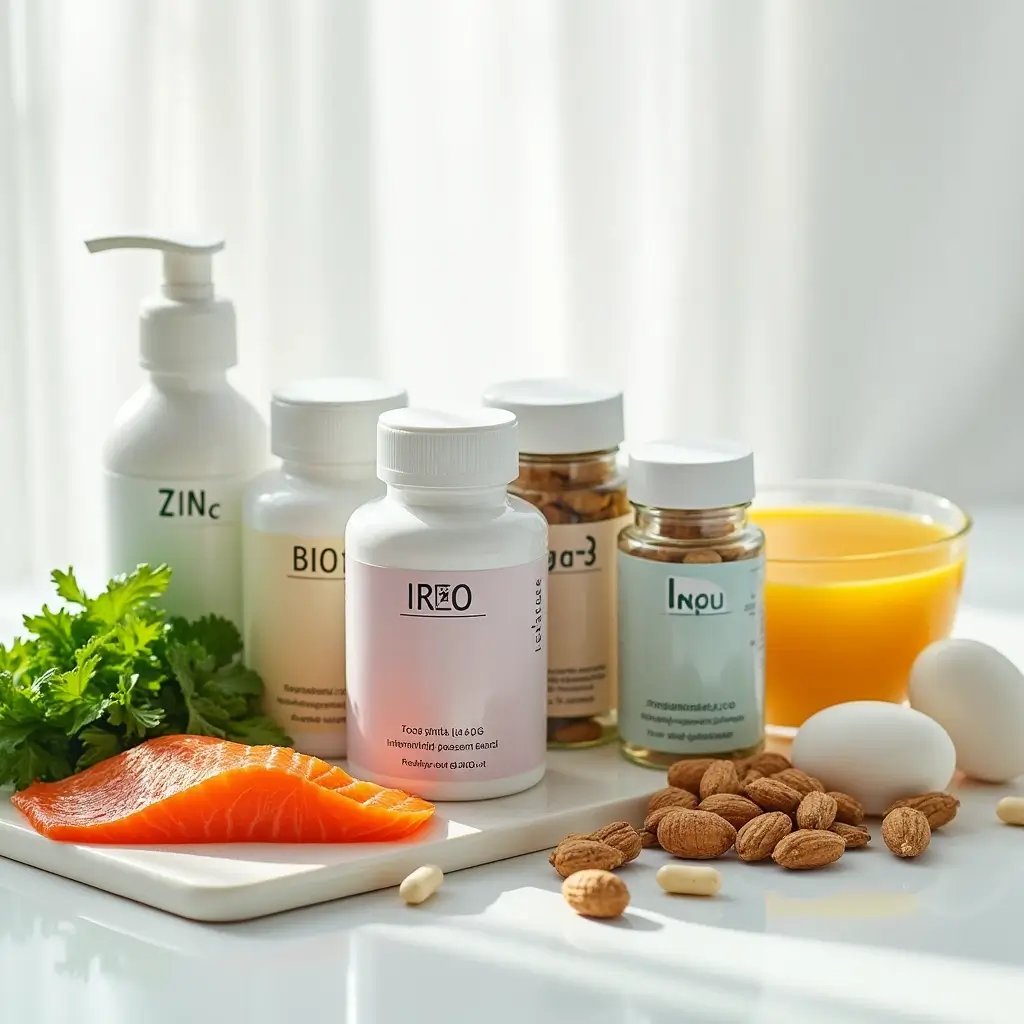But there’s good news: you don’t have to face this challenge alone. Supplements are a powerful tool in combating hair loss, as they provide essential nutrients that can promote hair growth, restore its thickness, and improve overall hair health. If you’re looking for a natural way to address your hair loss issues, the right supplements could be a game-changer.
In this article, we’ll explore some of the best supplements for women’s hair loss, focusing on those that offer scientifically-backed benefits to support your hair’s health. We’ll also cover how supplements work, the key nutrients to focus on, and tips for choosing the right one. By the end, you’ll be equipped with the knowledge to make informed decisions about which supplements could be right for you.
Understanding Hair Loss in Women: The Root Causes
To effectively address hair loss, it’s essential to first understand the underlying causes. Hair loss can occur for various reasons, and it’s important to pinpoint the cause to choose the right course of action. Whether the reason is genetic, hormonal, or due to lifestyle choices, understanding the source of your hair loss is the first step in finding the solution that works for you.
Common Causes of Hair Loss in Women:
- Genetics (Androgenic Alopecia): This is the most common cause of hair loss in women. If your mother or grandmother had thinning hair, you might be genetically predisposed to hair loss.
- Hormonal Imbalances: Pregnancy, menopause, and conditions like polycystic ovary syndrome (PCOS) can cause hormonal changes that lead to hair thinning or shedding.
- Stress: Emotional or physical stress can trigger temporary hair loss known as telogen effluvium, where hair prematurely enters the shedding phase.
- Dietary Deficiencies: Lack of essential nutrients such as iron, biotin, zinc, and vitamin D can weaken hair follicles, resulting in thinning or shedding.
- Age: As you age, hair naturally enters a shedding phase. This is particularly common during menopause when estrogen and progesterone levels decline.
- Medical Conditions and Medications: Autoimmune diseases, thyroid imbalances, and certain medications, including chemotherapy drugs, can also contribute to hair loss.
By understanding the root cause of your hair thinning, you can better target your supplement regimen and lifestyle changes to address it.
How Supplements Can Help Combat Hair Loss

When it comes to combating hair loss, a balanced diet rich in essential nutrients is key. However, even with the best intentions, many women struggle to get all the nutrients they need from food alone. That’s where supplements come in.
Supplements work by filling the gaps in your diet, providing the vitamins and minerals that your hair needs to thrive. They can:
- Promote Hair Growth: Some supplements stimulate hair follicles, encouraging faster and stronger hair growth.
- Prevent Further Hair Loss: Certain nutrients strengthen existing hair and improve its resilience against environmental damage.
- Improve Scalp Health: A healthy scalp is crucial for healthy hair growth, and supplements can help nourish the scalp.
The key is to choose supplements that address the specific needs of your hair and your body. For example, if your hair loss is linked to a biotin deficiency, a biotin supplement might help restore your hair’s fullness. If it’s linked to a lack of iron, an iron supplement may be more appropriate.
Key Supplements to Consider for Thicker, Healthier Hair
There are several key supplements that stand out when it comes to supporting hair health and preventing hair loss. Below, we dive into the most effective options that can help restore your hair’s fullness and vitality.
1. Biotin: The Hair Growth Hero
Biotin, also known as vitamin B7, is often considered the ultimate supplement for hair health. It supports hair growth by improving keratin production and contributing to the health of hair follicles.
- How It Helps: Biotin aids in the conversion of food into energy and helps maintain healthy hair, skin, and nails. Biotin deficiency is often linked to hair thinning, so supplementing with biotin can promote hair growth and strength.
- Studies: Research has shown that biotin supplementation may help women with thinning hair, particularly those who are biotin deficient.
- Food Sources: Eggs, almonds, avocados, and sweet potatoes are excellent sources of biotin.
Recommended Dosage:
- For adults, the typical dose ranges from 30 mcg to 5,000 mcg per day, depending on the severity of your hair thinning.
2. Vitamin D: Supporting Follicle Health
Vitamin D is another essential nutrient that plays a vital role in hair growth. In fact, vitamin D deficiency has been linked to hair loss, particularly to conditions like alopecia areata.
- How It Helps: Vitamin D supports the growth of new hair follicles, which is crucial for maintaining a full and healthy head of hair. It also helps regulate the hair growth cycle, ensuring that your hair remains in the anagen (growth) phase for longer.
- Studies: Studies have shown that vitamin D deficiency can lead to hair thinning and shedding, making supplementation an effective remedy for some women.
- Food Sources: Sunlight is the best source of vitamin D, but it can also be found in fortified foods, fatty fish, and eggs.
Recommended Dosage:
- 2,000 to 5,000 IU per day, especially for individuals who are not getting enough vitamin D from sunlight or food sources.
3. Iron: Essential for Healthy Hair Growth
Iron is essential for transporting oxygen to hair follicles, which is critical for stimulating hair growth. If your body is iron-deficient, it may struggle to provide the nutrients your hair needs to thrive, leading to thinning or hair loss.
- How It Helps: Iron helps your body produce hemoglobin, which carries oxygen to your tissues, including your hair follicles. When your hair follicles lack oxygen, hair growth is stunted.
- Studies: Iron deficiency has been linked to hair loss in women, particularly those with heavy menstrual cycles or those who are pregnant.
- Food Sources: Red meat, leafy greens like spinach, lentils, and iron-fortified cereals.
Recommended Dosage:
- Women typically need about 18 mg per day, though pregnant women may need up to 27 mg/day to support their health and hair growth.
4. Omega-3 Fatty Acids: Nourishing Your Scalp
Omega-3 fatty acids are essential fats that play a crucial role in maintaining the health of your scalp. A healthy, nourished scalp is vital for strong, growing hair.
- How It Helps: Omega-3 fatty acids help reduce inflammation on the scalp, nourish hair follicles, and improve overall scalp health. They can also prevent dandruff, which can hinder hair growth.
- Studies: Research suggests that omega-3 supplementation may help increase hair density and reduce hair thinning, particularly in individuals with dry or flaky scalp conditions.
- Food Sources: Fatty fish like salmon and mackerel, flaxseeds, chia seeds, and walnuts.
Recommended Dosage:
- 1.1 to 1.6 grams per day for optimal scalp and hair health.
5. Zinc: Strengthening Hair and Preventing Loss
Zinc is a vital mineral that plays a significant role in cell growth and division, making it essential for healthy hair. Additionally, it helps regulate hormones involved in the hair growth process.
- How It Helps: Zinc strengthens hair follicles and helps prevent hair loss by supporting the immune system and promoting tissue repair. A lack of zinc can lead to hair shedding and a lack of new growth.
- Studies: Research shows that zinc supplementation may improve hair thickness and prevent further hair loss, particularly in individuals with zinc deficiencies.
- Food Sources: Meat, shellfish, legumes, seeds, and nuts.
Recommended Dosage:
- 8 to 11 mg per day for adult women.
6. Collagen: Building Blocks for Healthy Hair
Collagen is a structural protein that makes up a significant portion of your skin, hair, and nails. Supplementing with collagen can help support the health of your hair by promoting follicle strength.
- How It Helps: Collagen contains amino acids like proline and glycine, which are essential for building the proteins that make up your hair. Collagen also helps keep your scalp healthy, which is critical for hair growth.
- Studies: Some studies suggest that collagen supplements may help increase hair density and promote growth by improving the strength and elasticity of hair.
- Food Sources: Bone broth, chicken skin, and collagen powders.
Recommended Dosage:
- 2.5 to 15 grams per day of collagen peptides is recommended for hair support.
How to Choose the Right Supplement for Your Hair

With so many options available, it can be overwhelming to decide which supplement is best for your hair. Here’s a quick guide to help you make an informed choice:
- Identify the cause of your hair loss: Knowing whether your hair loss is due to hormonal changes, stress, or nutrient deficiencies can help you choose the right supplements.
- Choose high-quality supplements: Look for third-party-tested supplements to ensure you’re getting what’s promised on the label.
- Consult a healthcare provider: Before starting any new supplement regimen, it’s always best to consult with your doctor, especially if you have underlying health conditions.
Diet and Hair Loss: What You Need to Know
In addition to supplements, a well-balanced diet is crucial for hair health. Focus on foods rich in vitamins, minerals, and healthy fats that support hair growth. Some examples include:
- Lean proteins: Chicken, turkey, and tofu to provide the building blocks for hair growth.
- Healthy fats: Avocados, nuts, and olive oil to keep your scalp nourished.
- Fruits and vegetables: These provide essential antioxidants and vitamins like vitamin C, which supports healthy hair follicles.
Supplement Safety and Dosage: What to Keep in Mind
Supplements can be effective, but it’s important to use them safely. Here are some tips:
- Stick to the recommended dosage: Taking too much of any supplement can cause side effects or interfere with the absorption of other nutrients.
- Watch for interactions: Some supplements may interact with medications or other supplements, so always consult your doctor before starting a new regimen.
- Start with one supplement: It’s best to introduce one supplement at a time and monitor its effects before adding others.
FAQ: Common Questions About Supplements for Women’s Hair Loss
Q1: Can biotin really make my hair grow thicker?
Yes, biotin is essential for healthy hair growth, and supplementation can help improve the thickness and overall health of your hair, especially if you’re deficient in this nutrient.
Q2: How long does it take to see results from hair supplements?
Hair growth is a slow process, and you may start to see noticeable results after 3 to 6 months of consistent supplementation.
Q3: Are omega-3 supplements necessary for everyone?
Omega-3 supplements can be helpful, especially if you have a dry scalp or thinning hair, but it’s important to prioritize a well-rounded diet rich in essential fatty acids.
Conclusion: Embrace the Journey to Fuller Hair
Hair loss can feel overwhelming, but remember, you’re not alone. With the right supplements, diet, and a little patience, you can restore your hair’s thickness and strength. Supplements like biotin, vitamin D, omega-3s, and collagen are proven to help nourish your hair and support healthy growth. Just be consistent, stay informed, and consult with a healthcare provider to find the best approach for your hair health.
If you’re ready to take charge of your hair’s health, start with a supplement regimen today and embrace the journey to fuller, stronger hair!

